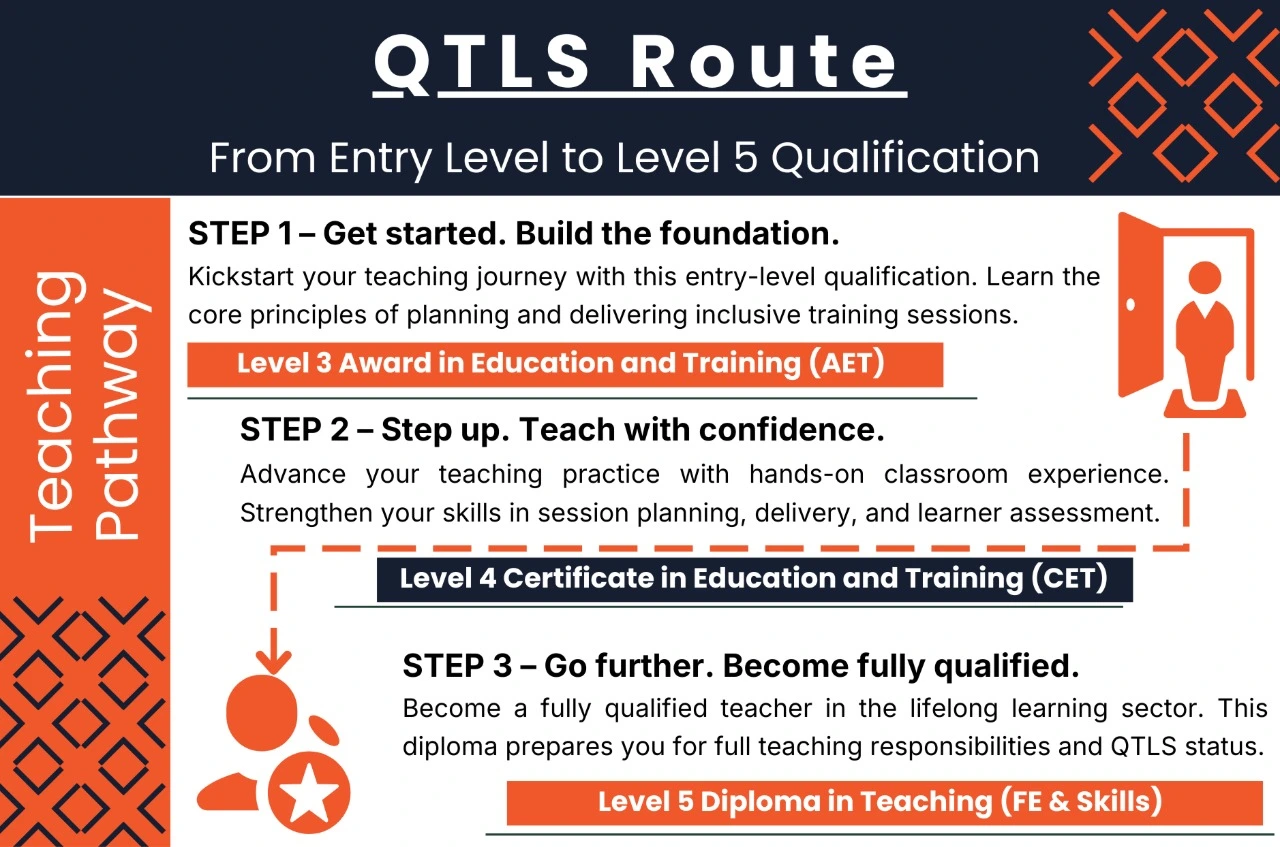Level 5 Diploma in Education and Training (DET) is an advanced teaching qualification designed for those already teaching in the post-16 sector. The qualification equips you with teaching methodologies, strategies, lesson planning and skills for the lifelong sector.
As of 31 August 2024, the DET has been officially withdrawn and replaced by the Level 5 Diploma in Teaching (Further Education and Skills) – the new nationally recognised qualification aligned with the latest ETF and Ofqual teaching standards.
Like the DET, the new DiT also prepares you to apply for Qualified Teacher Learning and Skills (QTLS) status via the Society for Education and Training (SET), enhancing your career opportunities across the further education sector.
Is the DTLLS Qualification Still Valid?
Yes, but no longer offered.
The DTLLS (Diploma in Teaching in the Lifelong Learning Sector) remains valid for those who completed it before its withdrawal. Similarly, the DET, which replaced DTLLS, is no longer accepting new registrations after 31 August 2024. These qualifications have now been officially replaced by the Level 5 Diploma in Teaching (FE and Skills), which meets updated national teaching standards and ensures that teachers entering the sector are equipped to deliver high-quality, inclusive education in post-14 settings. All new registrations must now enrol in the Level 5 Diploma in Teaching (FE & Skills).
Start Your Teaching Career with No Prior Experience
Absolutely. You can begin your teaching journey even without classroom experience by progressing through this pathway:
- Level 3 Award in Education and Training – introductory knowledge
- Level 4 Certificate in Education and Training – practical teaching fundamentals
- Level 5 Diploma in Teaching (FE & Skills) – includes at least 250 placement hours and 10 observations, per the new DiT specifications

The new Level 5 Diploma in Teaching (FE and Skills) is now the required qualification to teach in the post-16 education and training sector. This pathway ensures that you build your competence gradually while gaining hands-on experience.
Course Duration and Flexibility for Level 5 Teaching Qualification
Although the DET course previously took 12–18 months to complete, the updated qualification offers flexibility and support. The new DiT can be completed in approximately 12 to 24 months, depending on your availability and the delivery mode offered by the provider. The course includes at least 250 hours of teaching practice and a minimum of 10 assessed observations, in line with SET’s QTLS requirements. Learners benefit from structured mentoring, tutor support, and flexible online or blended delivery options to meet their personal and professional needs.
If you are ready to enrol on this course to advance further in your career, we offer this globally recognised and Ofqual-accredited qualification at Britannia School of Academics.
What Can I Do with a Level 5 Teaching Qualification?
With a Level 5 Diploma, you can teach in both the Further Education (FE) and Higher Education (HE) sectors. You can not only teach but also pursue different roles like training and development, instructional design, and educational consultancy.
Here is what you can achieve with a teaching and training diploma:
1. Apply for QTLS (Qualified Teacher Learning and Skills) Status
Although DET was the recognised route to QTLS, the updated Level 5 Diploma in Teaching (FE and Skills) is now the approved qualification. After completing it and joining SET, you can apply for QTLS. This professional status allows you to teach in further education and, in some cases, in secondary schools—especially in technical or post-14 subject areas. Unlike QTS, the QTLS route is typically faster and better suited for those focusing on vocational and adult education.
As long as you are a member of SET (Society for Education and Training) and hold QTLS status, you will be recognised as a qualified teacher. On top of that, the road to QTLS is much more straightforward than that of QTS, as you won’t have to go through the long and draining process.
2. Empowering SEN Students: How Level 5 Diploma Makes a Difference
Communication lies at the heart of effective teaching, especially for SEN students. It is a valuable source for students with Special Education Needs, and it not only enables you to communicate with each student on different levels but also shows you how to deliver lessons that support their learning pace and abilities.
The updated DiT includes a strong focus on inclusive practice and special educational needs. It enables you to communicate and teach effectively across a diverse range of learners by incorporating strategies such as differentiated instruction and the use of Individualised Learning Plans (ILPs). These tools are especially important when supporting learners with additional needs, allowing you to adapt your teaching style and pace to match their individual learning goals.
3. Explore Diverse Teaching Settings with Level 5 DET
Imagine being qualified enough to explore a range of avenues; well, you can achieve that with the updated Level 5 Teaching Qualification. Besides being an expert in your subject area, you can explore a range of educational environments, including further education colleges, private training providers, adult education centres, and work-based learning and share your knowledge with a diverse group of students and contribute meaningfully to their career progression and personal development.
4. Building an Inclusive Classroom
No matter whether you start teaching in a vocational setting, a college, or a university, you will have to teach a diverse range of learners. After completing your new level 5 teaching qualification, you will learn how to create and practise inclusive education to successfully foster a learning environment in the classroom where learners from all walks of life feel appreciated, welcomed, and seen.
Learn more about Building an Inclusive Classroom
5. Apply Practical Skills in the Classroom
Actions are more important than words; students should learn by doing, rather than just reading and writing. The new DiT promotes an efficient approach to teaching. You will gain the ability to connect theory with real-world application through lesson planning, formative assessments, and hands-on activities. This ensures that students are not only absorbing knowledge but are also able to use it in meaningful, career-related contexts. The qualification encourages reflective practice and a continuous cycle of improvement to support learner success.
What Career Paths Can I Consider After Achieving the Level 5 Diploma in Teaching?
- Educational consultancy, where you advise on curriculum, policy, or teaching methods.
- Leadership and management, including roles like Head of Department or Curriculum Leader.
- Corporate training and development, where you apply your expertise in designing and delivering workforce education and training programs.
It is important to know there are many roles that you can pursue beyond teaching, training or leadership roles. This qualification makes it possible for you to shift your focus on growth, learning innovations, and quality improvement. This qualification allows you to shape not only your own future but also the development of learners in a wide range of educational and professional contexts.
Conclusion
The Level 5 Diploma in Teaching (Further Education and Skills) is a new standard for those aiming to build a successful and impactful career in post-16 education. This qualification provides a comprehensive foundation in pedagogy, inclusive practice, and practical classroom application. As the recognised pathway to QTLS status, it opens up diverse opportunities across the further education landscape, from colleges and training providers to adult learning centres and beyond.
Related Products
-
OTHM Level 7 Diploma in Education Management and Leadership (RQF)
Rated 5.00 out of 5£114.89 – £1,200.00 Select options -
OTHM Level 6 Diploma in Teaching and Learning (RQF)
Rated 5.00 out of 5£114.89 – £1,200.00 Select options -
Focus Awards Level 5 Diploma in Teaching (FE and Skills) (RQF)
Rated 0 out of 5£114.89 – £1,200.00 Select options






